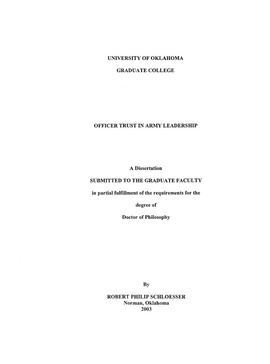| dc.contributor.advisor | Scott, Wilbur J., | en_US |
| dc.contributor.author | Schloesser, Robert Philip. | en_US |
| dc.date.accessioned | 2013-08-16T12:19:05Z | |
| dc.date.available | 2013-08-16T12:19:05Z | |
| dc.date.issued | 2003 | en_US |
| dc.identifier.uri | https://hdl.handle.net/11244/645 | |
| dc.description.abstract | The purpose of this research was to assess officer trust in Army leadership during the 1998--2000 timeframe. Research was prompted by a high rate of junior officer resignations, as well as an unprecedented rate of battalion and brigade level declinations of command. Qualitative in-depth interviews of 40 officers selected randomly at a division installation were accomplished. The respondents represented Army demographics from the perspective of rank, branch, race and gender. Eleven issues were addressed utilizing a fixed series of questions asked in an open-ended format. Interviews were taped and verbatim transcripts prepared and approved by respondents. The issues were: zero defects, the new officer efficiency report, operational tempo, women in the Army, downsizing implications, reduced retirements (REDUX), Gulf War Syndrome, health/dental care, expectations being met, state of morale and attitudes toward senior leadership trust and advocacy. In addition to interview responses, relevant commentary from 16 of 64 Command and General Staff College Class of 2000 class sections, which were generated at the request of General Shinseki, Army Chief of Staff at the time, are included. These comments were leaked to a Washington Post reporter who provided them to this researcher. | en_US |
| dc.description.abstract | Wilbur J. Scott, Ph.D., Professor, Department of Sociology, The University of Oklahoma, Norman, Oklahoma, was the advisor on this research as well as committee chair of the oral examination (dissertation defense). Dr. Scott has been selected as Distinguished Visiting Professor at the U.S. Air Force Academy for the 2004 calendar year. | en_US |
| dc.description.abstract | Of the 11 issues assessed, operational tempo was identified as the most significant factor prompting officer resignations, low morale and a general sensing across respondents that the senior leadership was out of touch, too politically correct, unable or unwilling to say "no" to new commitments and, in general, not advocating for soldiers. Seventy-four percent of respondents were negative in regard to the state of morale and 56% were negative in regard to the trust and advocacy of senior leadership. Health and dental care was singled out as being far less than satisfactory. Recommendations for future research, as well as recommendations for the Army leadership to consider in order to resolve morale issues, are provided. | en_US |
| dc.format.extent | ix, 199 leaves : | en_US |
| dc.subject | Business Administration, Management. | en_US |
| dc.subject | Sociology, Industrial and Labor Relations. | en_US |
| dc.subject | United States. Army Management Public opinion. | en_US |
| dc.subject | United States. Army Officers Attitudes. | en_US |
| dc.title | Officer trust in Army leadership. | en_US |
| dc.type | Thesis | en_US |
| dc.thesis.degree | Ph.D. | en_US |
| dc.thesis.degreeDiscipline | Department of Sociology | en_US |
| dc.note | Adviser: Wilbur J. Scott. | en_US |
| dc.note | Source: Dissertation Abstracts International, Volume: 64-09, Section: A, page: 3373. | en_US |
| ou.identifier | (UMI)AAI3107285 | en_US |
| ou.group | College of Arts and Sciences::Department of Sociology | |
